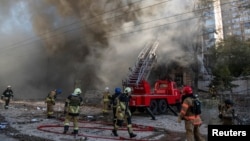Russia has been buying artillery shells and missiles from North Korea, buying drones and ballistic missiles from Iran and strengthening ties with the Taliban in Afghanistan to sustain its war in Ukraine.
All three governments are under U.N. embargoes that prohibit arms trade and financial dealings with the countries to curtail weapons proliferation and human rights abuses. Russia, a permanent member of the U.N. Security Council, has also provided diplomatic support to Iran and North Korea, including by vetoing sanctions.
Iran
Iran has supplied Moscow with more than 2,000 Shahed-136/131 kamikaze drones and 18 Mohajer-6 drones since Russia's full-scale military invasion of Ukraine in February 2022. Russia extensively used the Iranian drones to attack Ukraine’s critical infrastructure and civilian targets, and to deplete Kyiv’s air defense systems.
Ukraine said in September that Russia had deployed more than 8,060 Iranian-designed drones since the beginning of the full-fledged war. This number includes both Iranian-made drones and drones manufactured in a factory in the Russian republic of Tatarstan using Iranian parts and technology.
Additionally, Iran has helped replenish Russia’s munitions, providing hundreds of ballistic missiles in 2024.
Russia has reportedly pledged to supply Iran with Su-35 fighter jets and advanced air defense systems. Some Russian technology, such as the Yak-130 aircraft for training Su-35 pilots, has already reached Iran, though the extent remains unclear.
Iran also provides propaganda support to Russia aligning the top government officials’ rhetoric and the news media language with the Kremlin’s Ukraine narratives. For example, Iranian Supreme Leader Ali Khamenei described on multiple occasions Russia’s aggression as a “defensive act” against an imperialistic West and NATO.
U.N. sanctions on Iran, led by the U.S. and supported by the European Union, target Tehran’s nuclear program, arms trade and financial systems. The restrictions are designed to curb Iran’s destabilizing activities in the region and beyond. Russia’s engagement in arms trade not only contravenes restrictions on arms exports but also boosts Iran’s military industry.
North Korea
Since September 2023, North Korea has reportedly supplied Russia with up to 5 million artillery shells, a substantial figure given Russia’s annual production capacity of only 2 million to 3 million shells. Russia also deployed in Ukraine North Korean KN-23/24 ballistic missiles, though their failure rate is reportedly high.
Apart from weapons trade, Russia supports North Korea diplomatically - for example, in international forums and by opposing U.N. sanctions on its oil imports and nuclear industry. In March, Russia vetoed a resolution renewing the U.N. Panel of Experts monitoring sanctions on North Korea.
In June, North Korea and Russia signed a strategic partnership treaty committing to provide full military and other support if either faces an armed invasion or war.
Russia’s importing of weapons and ammunition from North Korea violates U.N. Security Council sanctions prohibiting arms trade with Pyongyang.
These sanctions were established to curtail North Korea's weapons programs and have been reinforced with additional measures targeting its cyber activities and ship-to-ship transfers.
The Taliban
The Russian government designated the Taliban as a terrorist group in 2003 and banned its activities in Russia. In May 2024, Russia's foreign and justice ministries proposed to Russian President Vladimir Putin to remove the Taliban from the government’s list of terrorist organizations, where it remains to this day.
However, since the Taliban took power in Afghanistan in August 2021 following the U.S. withdrawal, the Kremlin has been gradually developing ties with the group. Since 2022, Taliban delegations have attended every International Economic Forum held in Russia’s “northern capital,” St. Petersburg.
Moscow aims to strengthen economic partnership with the Taliban, envisioning Afghanistan as a transit hub for exporting natural gas to India and goods to Pakistani ports. However, this requires building a gas pipeline and extending a railroad from Mazar-i-Sharif, the regional hub of northern Afghanistan.
Russia’s developing economic ties with the Taliban can potentially violate international frameworks that sanction the Taliban as a terrorist organization and undermine measures aimed at isolating the group because of its human rights abuses and historical links to terrorism.
No country formally recognized the Taliban as Afghanistan's legitimate government, but China and the United Arab Emirates have accepted Taliban-appointed ambassadors.




